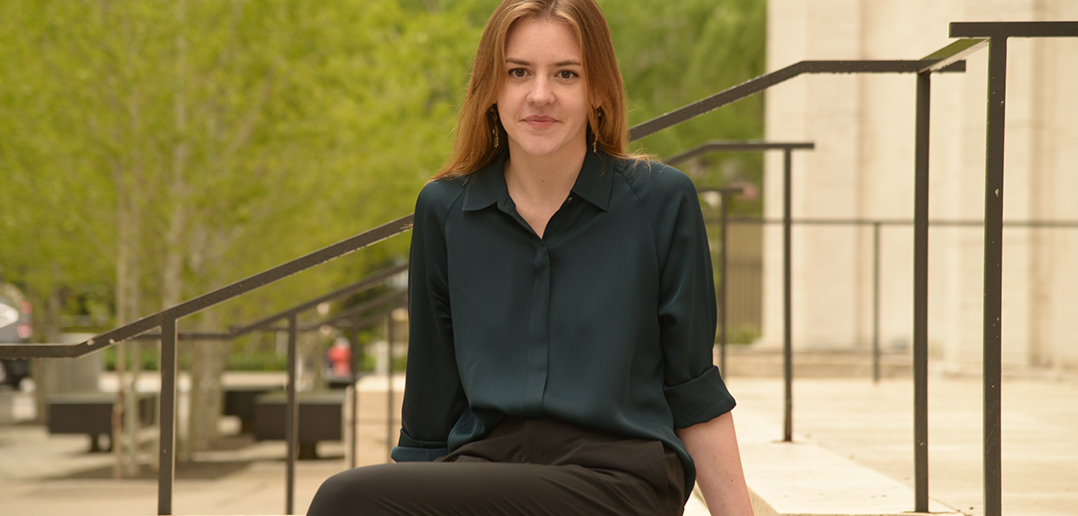But when the pandemic hit, she wanted to ask different kinds of questions.
“I thought that if the world is being utterly changed, do I want to be stuck covering politics, which then was mostly Trump, or do I want to do something more intimate and expansive and meaningful? And I chose the more meaningful thing,” she said.
So she enrolled in GRE’s pastoral mental health counseling program, which prepares students to become professional mental health counselors through coursework and internships. After graduation, she will complete an internship at the Addiction Institute of Mount Sinai, where she has spent the last year counseling people addicted to opioids.
Lloyd said that her training as a reporter helped her listen and empathize, but with a different approach than the ones she’s learned at GRE.
“I think part of growing as a reporter is interacting with people’s stories and wishing you could grab onto them more meaningfully, yet you continually get ripped back into the churn of putting out the next story,” she said, so you’ve got to move fast and tie up a story quickly.
“So when I started the GRE program, my style of asking questions was too much like a reporter. With the training, I became more attentive, open-ended, and therapeutic.”
Her mentor, GRE Associate Professor Lisa Cataldo, Ph.D., concurred.
“I think what Alice really learned in the process was that she did not want to just listen to people’s stories of suffering, she wanted actually help them. But when she came to GRE, she had to learn a new way of listening,” said Cataldo.
“Her probing curiosity was very useful, but it had to be modified and used in a different way.”
Cataldo said that what distinguishes the GRE program from other counseling programs is its spiritual component.
“We train people to bring a spiritual perspective to the work they’re doing, and to be able to engage the spirituality of their clients with a degree of expertise in both spirituality and psychology,” she said.
It was that dimension of the program that was attractive to Lloyd.
“I was brought up in the Episcopal church and I have a love for them. But what I like about the program is its spiritual diversity. Some of my classmates are clergy, some are laypeople, and not all of them are Catholic,” she said. “During the pandemic when classes were only held on Zoom, I recruited a young woman who was in rabbinical school to join the program.”
Lloyd she has held an interest in Catholicism for years. She wrote her undergraduate capstone paper at Dartmouth College on Marian iconography and psychology—making the move to GRE a natural progression, she said.
“My first year here at GRE, we took courses on Ignatian Discernment of Spirits and read Christian mystics and the Desert Fathers right alongside the counseling theories,” she said.
The work has increased her interest in spirituality, which complemented her interest in psychology. Cataldo said she’s noticed it as well.
“We’ve talked about the intersection of psychology and religion,” said Cataldo. “Alice is so smart and so curious, now she’s channeling all that intelligence and curiosity towards helping people to really change their lives—and I can tell you that she’s become a truly solid clinician.”
For a spiritual practitioner like Lloyd, keeping one’s beliefs at bay can at times prove challenging, but she strikes a balance when working with patients, particularly because she is practicing the harm-reduction model of addiction treatment. Unlike the 12-step model, which embraces a higher power, the harm reduction model generally eschews spirituality.
“It’s a practice and a way of looking with a closer focus on behaviors, consequences, risk,” she said. She admitted that she sometimes gets frustrated withholding her spirituality in check.
“But it can be rewarding in group therapy when patients get talking to each other and their spirituality comes out. But, later, when I’m writing a treatment plan and notes, there’s not much room for that,” she said.
On further reflection, she said the very act of listening to her patients is spiritual.
“At GRE, I’ve come to an understanding of mental health that is a working relationship with the unknown, be it the unknown outcome that makes one anxious, or an unknown like ‘What happens when we die? What is the nature of reality?’” she said.
“Those are questions that take you into spiritual territory right away, with the big mystery, the cosmic blur. That’s the definition of mental health that I kind of move through the world with.”
In the end, she tipped her hand on where she lies on the question of a higher power being helpful to those living with addiction.
“How could it not have a healing influence on the psyche to say that a seemingly impossible thing happened? Right? You know, what other impossible things are possible? If Mary can be assumed body and soul into heaven, who knows, maybe I can get through the day without a drink.”

